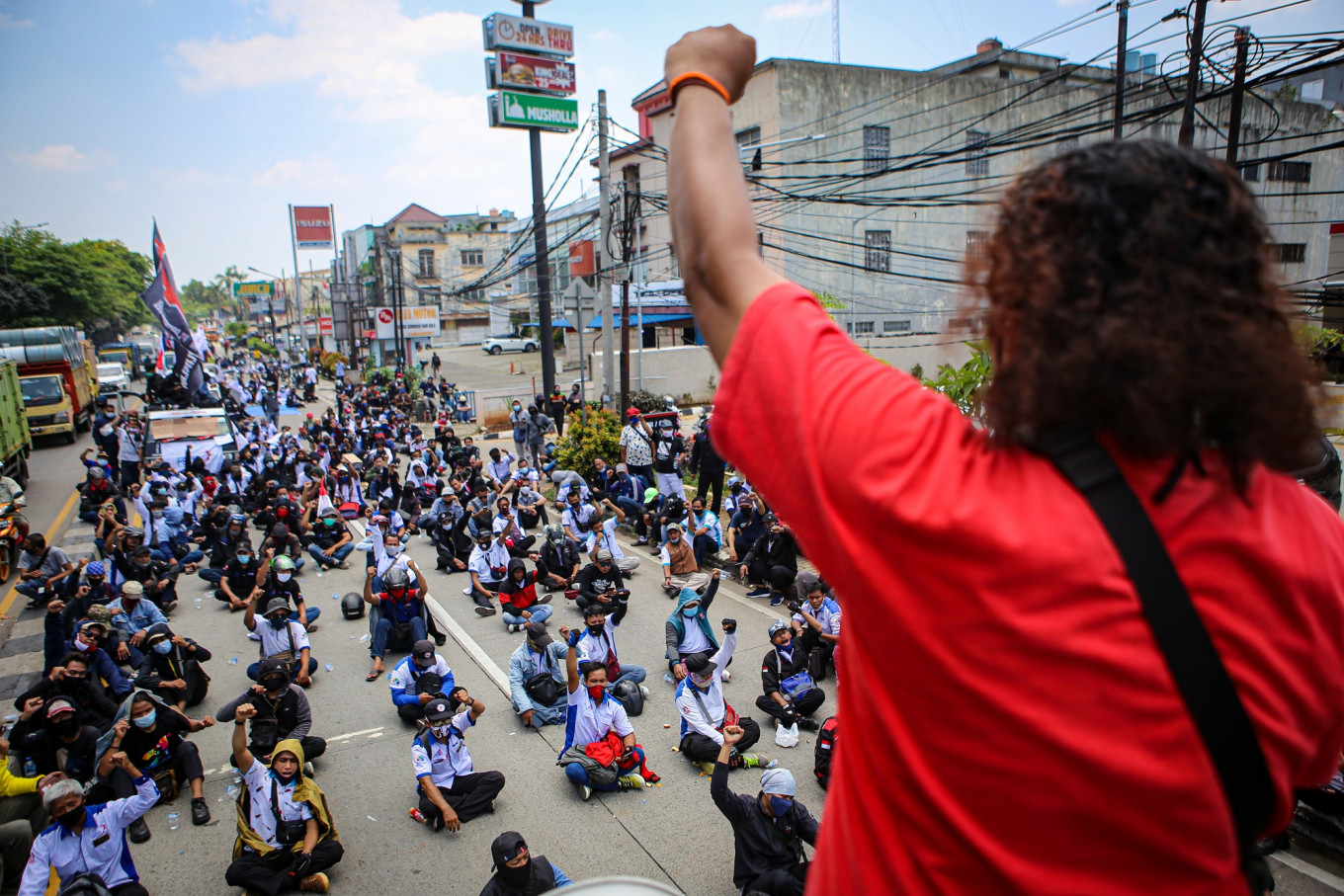Popular Reads
Top Results
Can't find what you're looking for?
View all search resultsPopular Reads
Top Results
Can't find what you're looking for?
View all search resultsInterfaith leaders join opposition to jobs law, call for judicial review
Change text size
Gift Premium Articles
to Anyone
I
ndonesian religious figures have joined members of the public who stand in opposition to the newly passed Job Creation Law, calling for a judicial review petition while arguing that the law is a threat to social and economic justice and environmental sustainability.
The interfaith network, represented by Muslim clerics Maksum Mahfudz, Busyro Muqoddas and Roy Murtadho, Christian pastors Merry Kolimon and Penrad Sagian, and Syncretic Beliefs Council representative Engkus Ruswana, declared their stance in rejecting the law in a statement issued on Monday.
An online petition posted by Penrad on change.org also called for the public to join the call in opposing the law. As of Tuesday afternoon, more than 1 million people had signed the petition.
“The church sees that religious leaders must stand for the marginalized communities in society,” Merry, the chair of the synod of the Evangelical Church in Timor (GMIT), said in a webinar on Tuesday.
“This law is threatening the lives of marginalized groups such as workers, poor farmers and poor urban society and indigenous communities. That’s why the church needs to fight for social justice and encourage a judicial review.”
Read also: Unions, groups brave COVID-19, police threat to protest Job Creation Law
A women’s rights activist, Merry added that the law also widened the vulnerability of women workers, in addition to the environment and democracy.
The House of Representatives and the government passed the controversial omnibus bill on job creation into law on Monday amid mounting objections from various groups.
The law aims to improve bureaucratic efficiency and cut red tape, particularly in regard to business permits and investment, both foreign and domestic. Among the key changes are lower maximum severance pay for laid-off workers, the relaxation of environmental license requirements for businesses and the central government’s stronger role in issuing business licenses.
Indigenous groups have long sided with labor unions, environmentalists and rights activists in opposing the law since its deliberation stage, citing concerns that once it is enforced, it would open up even larger swathes of land for investors and potentially lead to more conflicts with indigenous groups over their customary land.
“The Syncretic Beliefs Council is still worried about openly criticizing the government as we are still being discriminated against. However, now we see that the law will further hamper the lives of indigenous people,” Engkus said.
He cited as an example the indigenous people of East Sumba in East Nusa Tenggara who claimed that their customary land was taken over by sugar company PT Muria Sumba Manis in 2019. The people lost their main source of livelihood and their tribal land, Engkus added.
Roy, a young Muslim cleric, called for interfaith groups in Indonesia to unite in criticizing what he called oligarchic practices and social injustices manifested through the newly passed law.
Read also: Amnesty dubs new Omnibus Law 'catastrophic', petition urges no confidence motion
“Love can only stand above justice. But now, the justice for labors, fishers, farmers has gone,” he said.
The people of Kodingareng, South Sulawesi, he said, were an example of a group that was intimidated by members of security forces for protesting against sand mining investor PT Royal Boskalis. The company, activists allege, are responsible for damaging the marine ecosystem and threatening the lives of traditional fishers in the area.
“Claiming it is for development and the economy, the law has become a tool to destroy the livelihoods of the people. It will provide easy access to corporations and the authority to take away land and natural resources belonging to society,” the community further wrote in its statement.
Labor unions and civil society organizations took to the streets in various cities across the country on Tuesday to protest the law. They plan to stage the protests until Thursday.
In response to the opposition, lawmakers advised the public to turn to the Constitutional Court to challenge the law by filing a judicial review petition.









